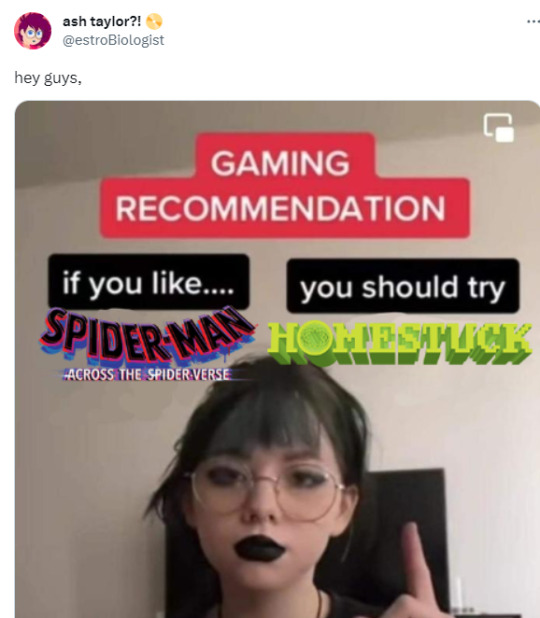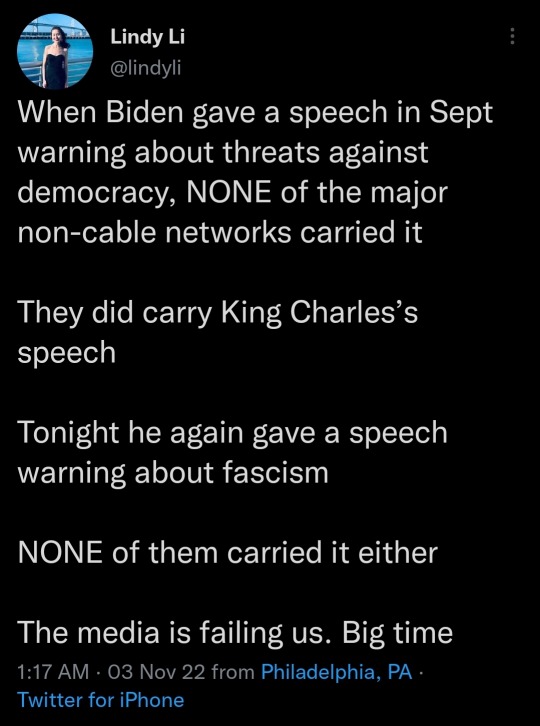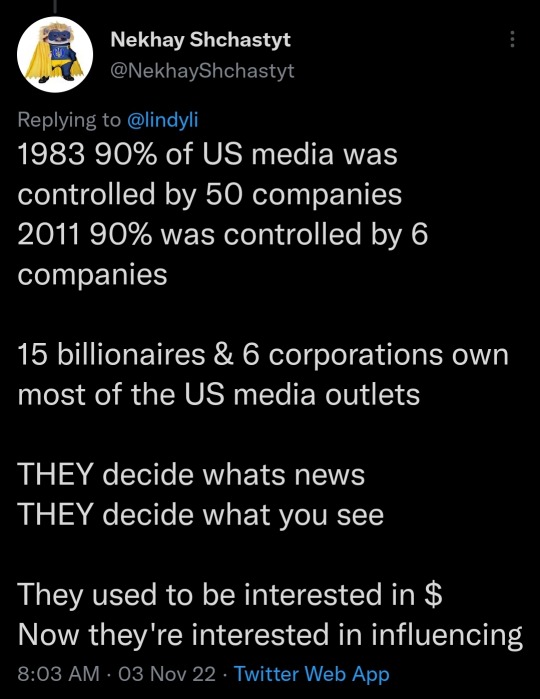#major television networks
Photo


2 notes
·
View notes
Text
i think anything that can be said about it has already been said but god that mjf promo shouldve been cut from the start. just awful shit all around. they gotta cut out the bigoted heel shit from wrestling.
#further thoughts. satire requires a clarity of purpose and target or else it contributes to what it intends to satirize#as well as this feels even more foul when you see takeshita lose minutes later#and once again there probably needs to be skme degree of creative control. like not everyine needs to memorize their words line by line#but also like. its a television show on a major network with a large audience. you cant be lettinf shit like that get to tv
22 notes
·
View notes
Text
Everyone I can think of who ever headed a children's cartoon hoped on some level it'd have a cool toy line in stores and in almost all cases the networks said no unless it was an older IP like turtles or star wars. The crews for almost every CN original, Nick toon or Disney animated series had their own dream ideas for dolls and action figures and plushes but none of that ever happened because the industry is convinced it just doesn't work with new IP.
But meanwhile, little indie *video games* have toys selling out at major retail chains.
And it's kind of shocking to realize it might be because indie video games are somehow now more visible to kids than "television shows." Kids can't bond anymore over cartoon series as easily, unless they all have the same streaming services. But they can all go on YouTube and see a guy pretending to get scared of huggly wuggly. They don't even have to play the games to be fans. Gaming has accidentally figured out the formula the cartoon industry never did. Imagine how much money they'd make if all their shows were always just totally free for kids to watch on YouTube.
1K notes
·
View notes
Text
Post-postmodernism in Pop Culture: Homestuck’s Revenge
I recently saw an excellent video essay titled Why Do Movies Feel So Different Now? by Thomas Flight. Though the title is opaque clickbait, the video is actually about major artistic zeitgeists, or movements, in film history. Flight describes three major movements:
Modernism, encompassing much of classic cinema, in which an earnest belief in universal truths led to straightforward narratives that unironically supported certain values (rationalism, civic duty, democracy, etc.)
Postmodernism, in which disillusionment with the values of modernism led to films that played with cinematic structure, metafiction, and the core language of film, often with more unclear narratives that lacked straightforward resolutions, and that were skeptical or even suspicious of the idea of universal truth
Metamodernism, the current artistic zeitgeist, which takes the structural and metafictional innovations of postmodernism but uses them not to reject meaning, but point to some new kind of meaning or sincerity.
Flight associates metamodernism with the “multiverse” narratives that are popular in contemporary film, both in blockbuster superhero films and Oscar darlings like Everything Everywhere All at Once. He argues that the multiverse conceptually represents a fragmented, metafictional lack of universal truth, but that lack of truth is then subverted with a narrative that ultimately reaffirms universal truth. In short, rather than rejecting postmodernism entirely, metamodernism takes the fragmented rubble of its technique and themes and builds something new out of that fragmentation.
Longtime readers of this blog may find some of these concepts familiar. Indeed, I was talking about them many years ago in my Hymnstoke posts, even using the terms “modernism” and “postmodernism,” though what Flight calls metamodernism I tended to call “post-postmodernism” (another term used for it is New Sincerity). Years before EEAAO, years before Spider-verse, years before the current zeitgeist in pop cultural film and television, there was an avant garde work pioneering all the techniques and themes of metamodernism. A work that took the structural techniques of postmodernism--the ironic detachment, the temporal desynchronization, the metafiction--and used them not to posit a fundamental lack of universal truth but rather imbue a chaotic, maximalist world of cultural detritus with new meaning, new truth, new sincerity. That work was:
Homestuck.
That’s right! Everyone’s favorite web comic. Of course, I’m not the first person to realize the thematic and structural similarities between Homestuck and the current popular trend in film. Just take a look at this tweet someone made yesterday:

This tweet did some numbers.

As you might expect if you’re at all aware of the current cultural feeling toward Homestuck, many of the replies and quotes are incredibly vitriolic over this comparison. Here’s one of my favorites:

It’s actually quite striking how many elements of the new Spider-verse are similar to Homestuck; aspects of doomed timelines, a multiversal network that seems to demand certain structure, and even “mandatory death of parental figure as an impetus for mandated personal growth” are repeated across both works. The recycling and revitalization of ancient, seemingly useless cultural artifacts (in Homestuck’s case, films like Con Air; in Spider-verse, irrelevant gimmick Spider-men from spinoffs past) are also common thematic threads.
As this new post-postmodern or metamodern trend becomes increasingly mainstream, and as time heals all and allows people to look back at Homestuck with more objectivity, I believe there will one day be a rehabilitation of Homestuck’s image. It’ll be seen as an important and influential work, with a place inside the cultural canon. Perhaps, like Infinite Jest, it’ll continue to have some subset of commentators who cannot get past their perception of the people who read the work rather than the work itself even thirty years after its publication, but eventually it’ll be recognized for innovations that precipitated a change in the way people think about stories and their meaning.
Until that day, enjoy eating raw sewage directly from a sewer pipe.
(Side note: I think Umineko no naku koro ni, which was published around the same time as Homestuck and which deals with many similar themes and then-novel ideas, will also one day receive recognition as a masterpiece. Check it out if you haven’t already!)
3K notes
·
View notes
Text
Twins announcer Jim Kaat calls Nestor Cortes ‘Nestor the Molester’
Twins announcer Jim Kaat calls Nestor Cortes ‘Nestor the Molester’
Ugh.Image: Getty Images
Baseball can’t go a week without someone saying something incredibly stupid.
Recently, it was Josh Donaldson. On Thursday, Jim Kaat, a 2022 Baseball Hall of Fame inductee and broadcaster for the Twins, unloaded another horrid remark, his second in a calendar year that raises the question: “Why is he still in the booth and given a live microphone?”
The 83-year-old Kaat…
View On WordPress
#Baseball#Chris Archer#Deadspin#Jim Kaat#Josh Donaldson#Jr.#KAAT#Major League Baseball#Major League Baseball on NBC#Major League Baseball on television#Miguel Cabrera#Minnesota Twins#MLB#MLB Network#Nestor Cortes#Nestor Cortés Jr#New York Yankees players#Sports#YES Network#Yoan Moncada
0 notes
Text
the death of reruns was the death of television.
we talk a lot about why streaming is killing television, but i think one factor that is under-discussed is syndication. there have been some good short-run series, but the majority of our most beloved series had long runs. like, 5+ season runs. runs that hit that sweet 100 episode mark, meaning they qualified for the most lucrative syndication deals. streaming shows are reducing and eliminating the need for such deals because they’re so siloed. instead of making a syndication deal with another station (and paying your creatives fair residuals), streaming services host their shows on their own platforms and instead pay the streaming rights residuals that are nowhere near as fair.
because these streaming networks (both streaming-only, like netflix, and core networks with original content streaming, like cbs and nbc) aren’t selling their shows off-platform, they don’t need to hit any kind of episode landmark to be cost-saving. you can host a show in any increment, so having a 20-episode series is the same as having a 60-episode series. except the 60-episode series, of course, takes longer and costs more to produce. as long as a network makes one season of a show, they get to market it for new viewers. and once they feel they’ve gotten all the new subscribers they will out of a series, they drop it to save money.
until there is some monetary benchmark incentive to get a series past one or two seasons, television as long-form storytelling is dead.
#netflix#streaming#television#this isn't specifically about warrior nun but it's the most recent reminder#i'm so tired#meta#kind of#~#wordles#wistfulwatcher text#idk what happened on the first version of this post 🤨#mine#1k#2k#3k
3K notes
·
View notes
Note
Hi sorry if it’s is a dumb question but I don’t understand what’s happening with the Tony’s do yo mind telling me? I’m not American so I don’t really get how the wga strike is related , is this a punishment to the writers because of the strike?
Not a dumb question, I'm happy to explain. So. The WGA is on strike. Which means, no WGA members are doing any writing for broadcast television (among other things). Members who cross the picket line would face serious consequences, and non-member writers who work as scabs during the strike also risk serious consequences (like the inability to ever become a member).
The Tony Awards, although focused on Broadway, are nonetheless a televised broadcast. The jokes, the scripts, all the funny bits of dialogue etc? Those are not written by playwrights or naturally improvised by the various hosts and presenters. Those are written by screenwriters. The same screenwriters who are on strike.
So, because of that, in order for the Tony Awards to move forward as usual, the Broadway League went to the WGA to request a "strike waiver." What this means is, they wanted the WGA to agree to allow writers (and anyone striking in solidarity) to cross the picket line to write and produce the telecast without consequences (essentially to break the strike for this particular program).
Naturally, the WGA said no. Why "naturally," you may ask? Because the Tony Awards air on CBS, which is one of the networks that has caused the strike by refusing to negotiate in good faith with the WGA and putting corporate greed over basic human decency and the lives of hardworking people. Granting a strike waiver for this would undermine the whole point of the strike and do little more than line studio pockets with the advertising revenue and viewership from a major broadcast.
In sum: the Tony Awards can't air because they don't have the writers to write the broadcast (in theory, they could try to make it work anyway, but that would be unlikely to go well). If people are upset about that, then they should take it up with CBS. Fuck the Hollywood studios; Support Unions.
1K notes
·
View notes
Text
The Twitter algorithm disclosure makes perfect sense if you understand what their actual goal is. As far as I can tell, what they're trying to do is foster a platform consisting of a tiny core of mega-popular content creators in which exactly one creator entirely dominates any given sphere of interest (i.e., thereby ensuring that they're not competing with each other for clicks), surrounded by passive consumers who only engage in order to promote the content of the creator(s) they follow. Basically, they're creating to re-create the audience dynamics of network television.
(This should not come as a surprise; ever since major corporate players got involved in online media, their all-but-explicit goal has been to turn back the clock and transform the Internet into cable TV.)
1K notes
·
View notes
Text
[September 1] Don’t Fall For Hollywood Bosses’ New PR Spin
'Today marks the 122nd day of the Writers Guild of America (WGA) strike and 48th day of the Screen Actors Guild and American Federation of Television and Radio Artists (SAG-AFTRA) strike. The dual work stoppages have brought Hollywood to a standstill, with production halted on films and television programs, and premieres and other promotional events either scaled back or canceled. Both guilds are striking over demands that are more than reasonable, particularly given studio executives’ record pay. These demands include fair compensation for streaming media (particularly better residuals, which currently pale in comparison to what they are for network and cable broadcasts), robust studio support for health and retirement funds, and safeguards around the use of artificial intelligence. (For more on why WGA and SAG-AFTRA are on strike, read the excellent reporting of Jacobin’s Alex Press).
In a move that has shocked…pretty much no one, Hollywood bosses don’t want to share their earnings with the very storytellers responsible for generating them. At the same time, they’re happy to make workers pay the cost for their own miscalculations about streaming.
The major Tinseltown studios – organized under the Alliance of Motion Picture and Television Producers (AMPTP) trade association – remain stubbornly opposed to striking a fair deal with either guild. Under the leadership of AMPTP president Carol Lombardini, studios have employed brutal tactics to bust the strike, including threatening to drag things out until writers lose their homes and using management-friendly trade publications to pressure the guilds into accepting lowball offers. These tactics have backfired spectacularly: not only have they failed to end either strike, but they’ve also turned the public overwhelmingly against the AMPTP. A new Gallup poll finds that Americans back the WGA over the AMPTP by 72% to 19%, and SAG-AFTRA over AMPTP by 64% to 24%.
Aware of their reputational damage (but willfully ignorant of the anti-worker attitude that caused it), the AMPTP announced a “reset” to its approach this week – not by negotiating in good faith or meeting the guilds’ demands, but by hiring a pricey crisis-management PR firm to revamp its image! According to Deadline, the AMPTP has hired The Levinson Group – a D.C.-based PR shop best known for representing the U.S. Women’s National Soccer Team in its campaign for pay equity – to “reframe the big picture for studio and streamer CEOs who have been characterized as greedy, imperious and out of touch.”
If you’re feeling like you’ve seen this movie before, you’re not wrong. During the last WGA strike 15 years ago, studio bosses hired former Clinton comms strategists Mark Fabiani and Chris Lehane to revive the AMPTP’s flagging public image. The revolving-door duo were paid a jaw-dropping $100,000 per month by the AMPTP to strike-bust, deploying campaign-style spin attacks designed to break the WGA’s resolve.
As I wrote for The American Prospect in May:
“Fabiani and Lehane created a website with a live tally of the millions of dollars in income that guild members and on-set crew had purportedly lost by striking. They urged studio CEOs to publicly refer to WGA representatives as “organizers” rather than “negotiators” because the former “sound[ed] more Commie.” Lehane even told the press at one point that striking writers were “making more than doctors and pilots,” cynically arguing that the strike was harming “real working-class people” like below-the-line workers who had lost income from struck late-night talk shows […] Fabiani and Lehane were [also] the brains behind a “strongly worded and downright menacing” AMPTP press release breaking off negotiations with the WGA in December 2007. This move allowed the studios, which cited a protracted strike as an “unforeseeable event,” to invoke force majeure contract clauses and cancel multiple writer-producer deals worth tens of millions of dollars, severely demoralizing the WGA’s rank-and-file members.”
The parallels between 2008 and today are striking. Like Fabiani and Lehane (who have worked for scandal-plagued clients like Gray Davis, Bill O’Reilly, Lance Armstrong, and Goldman Sachs) the Levinson Group has no qualms about representing greedy and unsavory characters. Over the years, Levinson has done PR for predatory student lender Better Future Forward, reviled monopolist Live Nation/Ticketmaster, a talc mining company linked to the Johnson & Johnson baby powder cancer scandal, and Theranos fraudster Elizabeth Holmes.
And just like the ex-Clinton spin doctors, the Levinson Group boasts close revolving-door ties to powerful politicians and the news media. The firm currently represents President Biden’s personal attorney Bob Bauer and previously represented John Podesta’s family lobbying firm. Levinson partners have previously worked for an array of influential politicians, including former President Bill Clinton, Senators Jon Tester and Amy Klobuchar, Representatives Maxine Waters and Ted Lieu, and former and current Los Angeles Mayors Eric Garcetti and Karen Bass. The firm’s founder and CEO Molly Levinson spent eight years working for CNN and CBS, while two of the Levinson Group’s top managing directors are alumni of CNBC and The Wall Street Journal. With a web of strong connections to power players in the entertainment industry’s twin capitals of LA and New York, along with the nation’s capital, Levinson could help the AMPTP tilt the regulatory and media scales back in the bosses’ favor.
Though this may sound demoralizing, striking writers and actors shouldn’t lose hope. For one, consider a surprisingly uplifting parallel between 2008 and 2023. Fifteen years ago, after Fabiani and Lehane took the AMPTP’s contract, the SEIU and other unions that had previously worked with the duo severed ties with them for trying to bust the writers’ strike. Fast forward to this week: the U.S. Women’s National Soccer Team Players Association (Levinson’s star client!) publicly rebuked the firm for doing the AMPTP’s dirty work and voiced support for the dual WGA and SAG-AFTRA strikes. If history is any indication, it’s only a matter of time until other pro-union Levinson clients – like the majority SEIU-owned Amalgamated Bank – follow suit and sever ties with the firm.
There is also one crucial way in which 2023 is thankfully not like 2008: The Levinson Group is bad at their jobs.
Consider an August 27th New York Times article about AMPTP President Carol Lombardini*, which was almost certainly pitched or otherwise molded by Levinson flacks. The article goes to ridiculous lengths to rehabilitate Lombardini’s image:
The article passively describes Lombardini’s tenure as “marked by labor peace until now” (a peace that she has now broken) and shifts blame for her unpopular decisions to anonymous AMPTP members (how convenient!).
Article co-authors Brooks Barnes and John Koblin quote a 2014 email from then-WarnerMedia CEO Kevin Tsujihara praising Lombardini’s negotiation skills and recommending she receive a $365,000 bonus. Curiously absent from the article is any mention of Tsujihara’s high-profile 2019 resignation from WarnerMedia for pressuring actresses into non-consensual sex.
Barnes and Koblin attempt to paint a “she’s just like us” picture of Lombardini (who reportedly earns a $3 million annual salary), mentioning her upbringing in a “working-class town outside Boston” and love for Red Sox and Dodgers games.
Barnes and Koblin paint a rosy picture of the AMPTP’s “sweetened proposal” (their words) to the WGA, describing the studios’ August counteroffer as “including higher wages, a pledge to share some viewership data and additional protections around the use of artificial intelligence.” Barnes & Koblin never quote the WGA’s well-founded reasons for turning down this lowball offer, saying only that the WGA is “holding firm to demands related to staffing minimums and transparency into streaming-service viewership.”
Bizarrely, the core issue of underpaid streaming residuals (the main reason writers are demanding greater streaming transparency) is never mentioned in the article.
Barnes and Koblin frequently imply that criticism of Lombardini is unfair, describing her as an “easy target” for the “grievances of striking workers” and singling out a tweet purportedly “mocking [Lombardini] as a fuddy-duddy who hangs out at chain restaurants”.
Barnes and Koblin quote a pre-strike September 2022 Deadline interview with Teamsters organizer Lindsay Dougherty to claim that Lombardini has the “grudging respect” of union leaders who see her as a “fair individual.” They did not quote more recent statements from Dougherty, who last month tweeted that the “greedy” AMPTP had “declared war on Hollywood Labor” by refusing to negotiate in good faith with WGA and SAG-AFTRA.
In one unintentionally eyebrow-raising line, Barnes and Koblin state that Lombardini was “inspired to become a lawyer by reading articles about F. Lee Bailey.” Neither Bailey’s sordid clients (like OJ Simpson) nor his multiple disbarments are mentioned in the article.
And it’s not just me who finds the Levinson Group’s efforts laughable. Discussions of the NYT story on Reddit and Twitter are dominated by comments tying the story’s blatant reputation laundering for Lombardini to the AMPTP’s concurrent hiring of Levinson. A recent New Yorker puff piece on Warner CEO David Zaslav has been met with similar ridicule – with many commenters also pointing to Levinson’s potential influence. So too have recent stories from management-friendly trades like Deadline – all of which have failed to make a dent in strong public support for WGA and SAG-AFTRA. This is a good sign: not only is the public more inclined to side with striking workers than it was in 2008 – it’s also seemingly more attuned to the role of corporate PR flacks in shaping the media narrative. If studio bosses think they can remake the same movie and end another strike with flashy spin-doctors, they’re sorely mistaken.
So here’s my advice to the AMPTP (and it won’t cost you six figures per month to hear it): the way to fix your reputation problem is to end the strike by giving writers and actors what they want. No strike-busting comms team can rescue you from the hole you’ve dug yourself into.
As the LA Times’ Mary McNamara recently put it, “You’ve lost the war. The best thing to do now is negotiate the terms of surrender.”'
446 notes
·
View notes
Text
the thing with supernatural is. it was on a major television network for fifteen consecutive years. so yes technically it’s in the mainstream but somehow it had zero impact on pop culture. none of those actors are household names. it’s hardly ever referenced in other media. ask a stranger on the street to name any major character on that show. what are the odds they even know what you are talking about. i would argue nearly every other show on the wb/cw ranks higher in the zeitgeist. gilmore girls. riverdale. gossip girl. one tree hill. the vampire diaries. you understand.
and then in the same breath. indelible impact on internet culture. changed the very landscape of fanfiction. the crux of a large portion of the user base on this website. millions made at those fan conventions. supernatural cruise 2025. you understand.
so is it niche. absolutely not. is it mainstream. absolutely not.
170 notes
·
View notes
Text
i’ve talked a lot about the ways in which emotional vs. physical intimacy is explored on mash before but i do think it’s really significant that the show is ultimately very pro-sex. characters are not inherently shamed for being horny; in the case of margaret and frank, much of the humor around their relationship comes from their hypocrisy. uncomfortability with sex is also not shamed, as we see hawkeye in particular being supportive of radar and helping him with his nerves when it comes to dating/sex/relationships. sexual freedom is not only accessible to the men of the 4077th; while “edwina” is a messy episode politically, the take on lysistrata in conversation with the politics of early seventies feminism and the sexual revolution is interesting, especially for network television in 1973. jokes about sexual “perversion” and “degeneracy” are almost never at the cost of the subject they’re targeted at but used to point out the stupidity of the person delivering them and/or the comment itself. sex becomes less of a topic in the later years as there are more plotlines about emotional intimacy (specifically cheating) but sex itself is still treated as a positive (a big example is “major ego,” in which margaret having a one night stand with tom greenleigh is framed as a moment of personal growth). really interesting to me in terms of the show reflecting a shift in social politics throughout its run
166 notes
·
View notes
Note
I want to thank Oliver and Lou. That scene meant so much to me as someone who has always struggled with her sense of self, her sense of worth, and her sense of her own sexuality. To see these two characters that I have loved (even Tommy from his very first episode) share a moment on a major network television show means more to me than I could ever properly convey. Thank you. Thank you for caring for these characters that we love so much. Thank you for caring for us, the fans. Thank you.

SUBMIT YOUR 7X04 GRATITUDES HERE!
#evan buckley#tommy kinard#oliver stark#lou ferrigno jr#eddie diaz#bobby nash#hen wilson#chimney han#maddie buckley#athena grant nash#911 on abc#911 abc#911#911 7x04#ryan guzman#peter krause#angela bassett#kenneth choi#aisha hinds#jennifer love hewitt#tv: 911#thank you for your gratitude
118 notes
·
View notes
Text
HOUSE MEANINGS IN ASTROLOGY



[READ] People often question why there’s so many meanings for each planet/house and the reason is so that you can learn more than just one thing about yourself through each placement. Otherwise astrology would be very vague and boring. These are all meanings that I’ve learned from my astrology classes at Kepler College

1ST HOUSE: identity/self, outward personality traits, outlook on life/approach to life, appearance, physical body, beauty, confidence, beginnings, how you initiate/ambition, your mannerisms, your outward behavior, physical fights, your presence, individuality, and passion
2ND HOUSE: money/finances (how we spend it, store it, and manage it), work, short term jobs, your work ethic, material possessions, self worth, values, emotional security, stability, financial security, how you meet financial obligations, your singing voice, giving/receiving, and resources (both material and non material)
3RD HOUSE: communication, your speaking voice/the way you talk, your mind, the way you think/your thinking skills, your perceptions, your opinions, your conscious mind, neighbors, siblings, interests, gossip, ideas/information, mathematics, literature, transportation (only ground not flying/air), local media, social media, cell phones, phone calls, visits, social activity, publishing, early education (before college), short trips, and short journeys
4TH HOUSE: homes/houses, family/family roots, your parents (particularly the mother/motherly figure), your inner child, emotions, foundations, your childhood, heredity, tradition, self-care, places of residence, real estate, properties, femininity, and conditions in early life
5TH HOUSE: children, childlike spirit, talent, creativity, drama, risk-taking, spotlight, romance (shows short term relationships, flings, hookups, and if long term relationships then only puppy love), hobbies, pleasures, objects of affection, vacations, games, speculation, fertility, concerts, festivals, and joy
6TH HOUSE: daily routine/day to day life/daily tasks, your health/fitness/the work you do on your body, your duties, self improvement, consistency, step-siblings, your hygiene, innocence, systems, service to others, co-workers, analytical nature, diets, animals, and your pets
7TH HOUSE: long term relationships, marriage, concern for others, attraction/attractiveness, charm, conflicts, partnerships, business partners, contracts, love affairs, open enemies, close associates, lower courts, negotiations, peers, agents, equality, harmony, and sharing
8TH HOUSE: major transformation, sex, death, longevity, changes, joint/shared finances, investments, stock market, your partners resources, taxes, inheritance, reproduction, seduction, intimacy (in general not only sexual), rebirth, merging, taboos, resurrection, loans, assets, secrets, mystery, businesses, spiritual transformation, magic (especially black magic), psychology, surgery/operations, trauma, periods, and the occult
9TH HOUSE: wisdom, law/laws, beliefs, religion, philosophy, higher education (college/university), viewpoints, languages, foreign environments, in-laws (your relatives through marriage), ethics, long journeys, travel, ideologies, higher courts, media, television, interviews, cross-cultural relations, grandparents, and learning
10TH HOUSE: your legacy, your career, your public image, your status, your reputation, fame, long-term goals, worldly attainment, sense of mission, responsibilities, recognition, authority, father/fatherly figure, experts, bosses, achievements, and professional aspirations
11TH HOUSE: friends, friend groups, gains, money made from career, desires, step/half parents, step/half children, uniqueness, inventions, technology, film, social awareness, influence, manifestations, hopes and wishes for the future, ideals, humanitarianism, associates (not just close ones), groups (in general), politics, social networking, where you make your debut into society, companions, allies, science, socialization/social interaction, clubs, organizations, and parties
12TH HOUSE: healing, the hidden, karma, karmic debts, old age, sleep, mental health, solitude/isolation, dreams (the ones you have when you sleep), hidden enemies, hidden causes, illusions, secret bed pleasures, spirituality, fears, losses, endings, escapism, impersonations, closure, need for withdrawal/privacy, afterlife, limiting beliefs, subsconcious memory, subconscious mind, hypnotism, self-undoing, hidden desires, the past, delay, and restrictions

MASTERLIST
MORE BEGINNER ASTROLOGY
PLANET MEANINGS

© 𝐚𝐬𝐭𝐫𝐨𝐬𝐤𝐲 𝟐𝟎𝟐𝟑 𝐚𝐥𝐥 𝐫𝐢𝐠𝐡𝐭𝐬 𝐫𝐞𝐬𝐞𝐫𝐯𝐞𝐝
#house meanings#astrology houses#houses in astrology#astro community#astrology#zodiac#astro placements#astrology tumblr#astro chart#birth chart#1st house#2nd house#3rd house#4th house#5th house#6th house#7th house#8th house#9th house#10th house#11th house#12th house
914 notes
·
View notes
Text


FCC media deregulation under Michael Powell [Colin Powell's son] destroyed the radio/TV market in America.
The FCC said a single company can now own TV stations that reach 45 percent of U.S. households instead of 35 percent. The major networks wanted the cap eliminated, while smaller broadcasters said a higher cap would allow the networks to gobble up stations and take away local control of programming.
The FCC largely ended a ban on joint ownership of a newspaper and a broadcast station in the same city. The provision lifts all "cross-ownership" restrictions in markets with nine or more TV stations. Smaller markets would face some limits and cross-ownership would be banned in markets with three or fewer TV stations.
The agency also eased rules governing local TV ownership so one company can own two television stations in more markets and three stations in the largest cities such as New York and Los Angeles.
"The more you dig into this order the worse things get," said Michael Copps, one of the commission's Democrats. He said the changes empowers "a new media elite" to control news and entertainment.
1K notes
·
View notes
Text

a dieter bravo x nonbinary!reader-insert!oc series
This is it: your big break. Your first real role as a serious actor. It's a huge deal, a limited drama series produced by a major television and streaming network; it's slated to shoot you directly to stardom. All you have to do is not mess this up. Enter Dieter Bravo: your character's father, but your celebrity crush. Not messing this up just got considerably harder.
this reader insert character is: unnamed, afab and nonbinary (has female anatomy and uses they/them pronouns), neurodivergent, latinx, 21 years old, an actor playing a female character. I’m trying to keep them a physically blank slate but it is mentioned that they have longer hair (past shoulder-length) for the role and they wear a bikini for the role at one point as well. They are mentioned to be shorter than Dieter.
each chapter has its own rating and warnings. overall series rating is MA for eventual explicit content.

chapter one: this is what it looks like, right before you fall
You meet the cast and vow yourself to professionalism as filming starts, but one particular costar tests your willpower.
chapter two: haven’t seen the sun in a while but i heard that the sky's still blue
It's almost midnight, and there's bumping and groaning sounds coming from the hallway. You should probably investigate, right?
chapter three: why i gotta build something beautiful, just to go set it on fire?
Emotions have been running high lately, and it all comes to a head on set during a particularly tense scene.
chapter four: and that’s the problem with a closed door
No one really knows how to handle what happened on set last week, least of all you and Dieter. You each go about it in your own separate ways.
chapter five: if life is but a dream, then so are we
The end of shooting is quickly approaching, and you have a lot to sort out before picture wrap.
chapter six: i always shine, even when the light dim
Press interviews and red carpet events have your entire life turned upside down--but in a good way.

header and title: @beskarandblasters ; dividers: @saradika-graphics
follow @freelancearsonist-updates and turn on post notifications to be notified when new chapters are posted!
#dieter bravo#dieter bravo x reader#dieter bravo fanfiction#dieter bravo smut#the bubble#the bubble fanfiction#dieter bravo fic#the bubble fic#dieter bravo fanfic#pedro pascal fanfiction#pedro pascal characters#reader insert oc#nonbinary reader#series: free falling love addict
62 notes
·
View notes
Text

Ashlyn Gere
An extremely popular adult movie star of the 1990's, Ashlyn actually appeared in several B-movies during the 1980's before her adult career including Evil Laugh and Creepozoids. Her mainstream work also included being a body double in the films Basic Instinct and Indecent Proposal and landing bit parts on network television shows such as playing Feliciti OH in Space: Above and Beyond, appearances on the X-Files, Silk Stalkings and Millennium. All this while she was still working the adult film business. Her adult career included around 150 films, which lead to dozens of nominations and wining nearly 20 major adult industry awards such as the FOXE, XRCO and AVN Awards. In the latter half of the 1990s, she slowed down on her adult video work and mainly toured as an exotic dancer.
82 notes
·
View notes